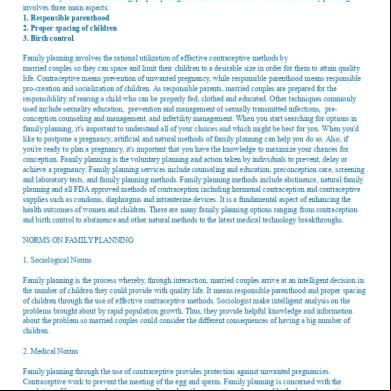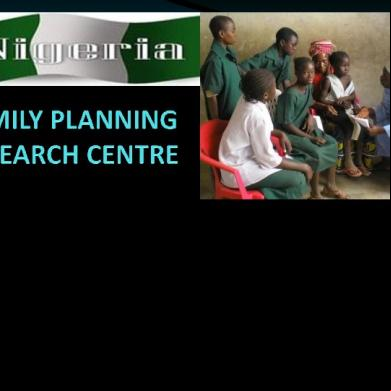Ss1 Family Planning Essay 705j5k
This document was ed by and they confirmed that they have the permission to share it. If you are author or own the copyright of this book, please report to us by using this report form. Report 3b7i
Overview 3e4r5l
& View Ss1 Family Planning Essay as PDF for free.
More details w3441
- Words: 464
- Pages: 1
Irish t. barcelon bsa-1 Family planning experts define family planning as the process by which responsible and mature couples, if they, determine by themselves the timing, proper spacing and number of children born to them. Family planning involves three main aspects: 1. Responsible parenthood 2. Proper spacing of children 3. Birth control Family planning involves the rational utilization of effective contraceptive methods by married couples so they can space and limit their children to a desirable size in order for them to attain quality life. Contraceptive means prevention of unwanted pregnancy, while responsible parenthood means responsible pro-creation and socialization of children. As responsible parents, married couples are prepared for the responsiblility of rearing a child who can be properly fed, clothed and educated. Other techniques commonly used include sexuality education, prevention and management of sexually transmitted infections, preconception counseling and management, and infertility management. When you start searching for options in family planning, it's important to understand all of your choices and which might be best for you. When you'd like to postpone a pregnancy, artificial and natural methods of family planning can help you do so. Also, if you're ready to plan a pregnancy, it's important that you have the knowledge to maximize your chances for conception. Family planning is the voluntary planning and action taken by individuals to prevent, delay or achieve a pregnancy. Family planning services include counseling and education, preconception care, screening and laboratory tests, and family planning methods. Family planning methods include abstinence, natural family planning and all FDA approved methods of contraception including hormonal contraception and contraceptive supplies such as condoms, diaphragms and intrauterine devices. It is a fundamental aspect of enhancing the health outcomes of women and children. There are many family planning options ranging from contraception and birth control to abstinence and other natural methods to the latest medical technology breakthroughs. NORMS ON FAMILY PLANNING 1. Sociological Norms Family planning is the process whereby, through interaction, married couples arrive at an intelligent decision in the number of children they could provide with quality life. It means responsible parenthood and proper spacing of children through the use of effective contraceptive methods. Sociologist make intelligent analysis on the problems brought about by rapid population growth. Thus, they provide helpful knowledge and information about the problem so married couples could consider the different consequences of having a big number of children. 2. Medical Norms Family planning through the use of contraceptive provides protection against unwanted pregnancies. Contraceptive work to prevent the meeting of the egg and sperm. Family planning is concerned with the regulation of human reproductive capacity. It involves the prevention of unwanted births by contraceptive techniques, or by reducing the length of exposure to pregnancy in order to protect the well-being of the mother, of the family.










